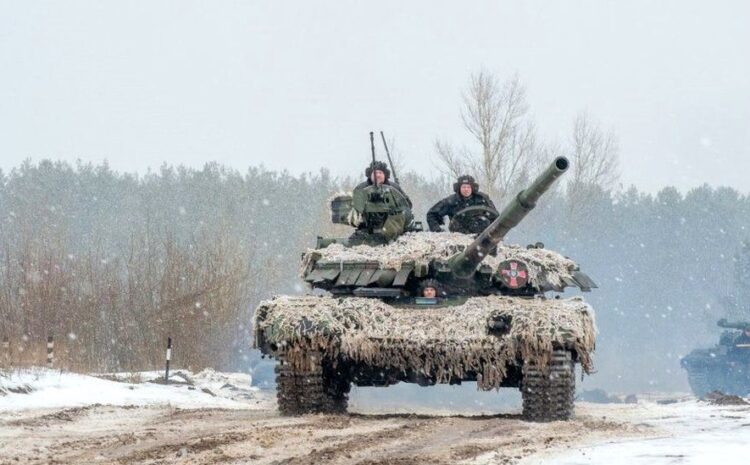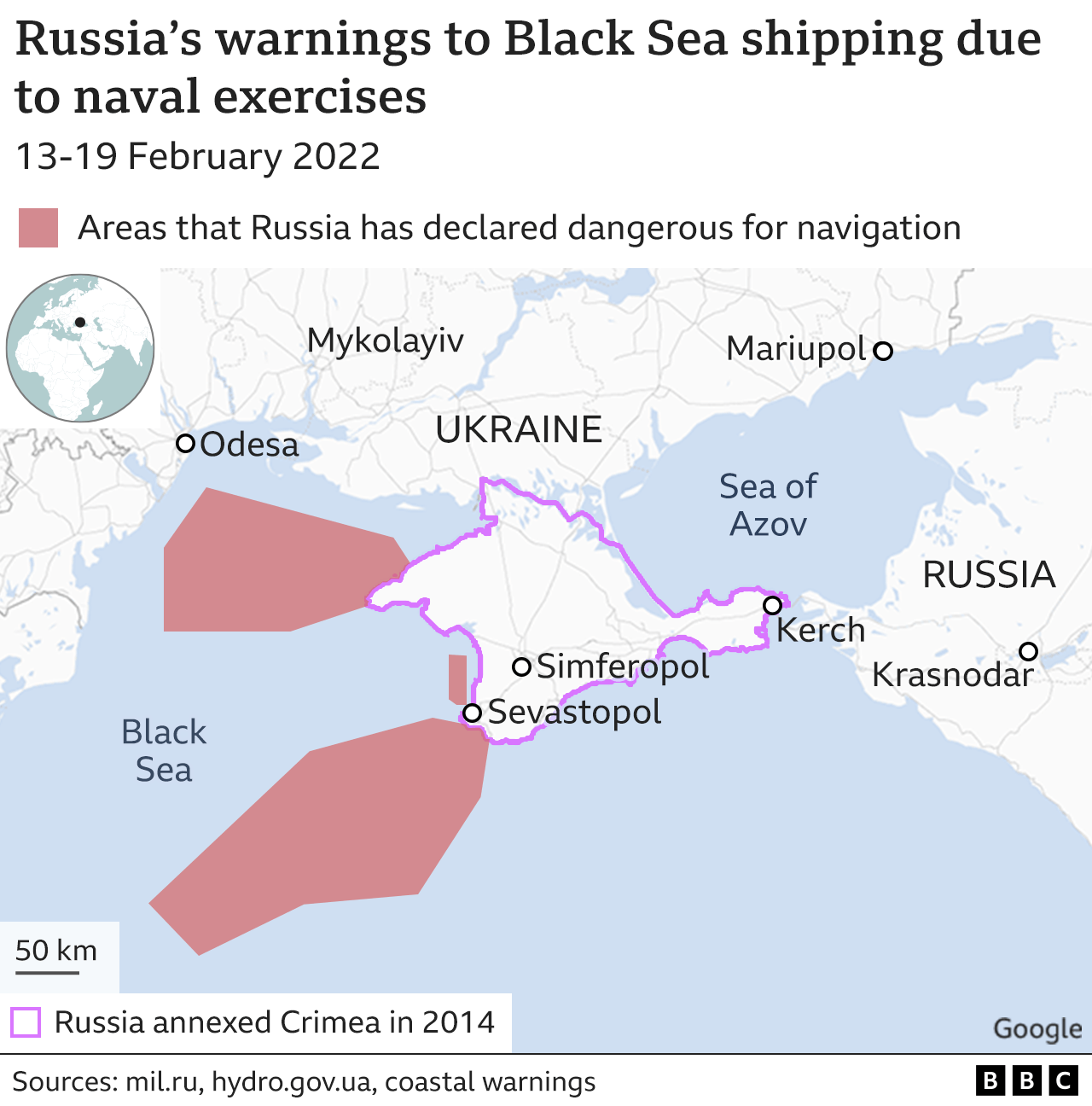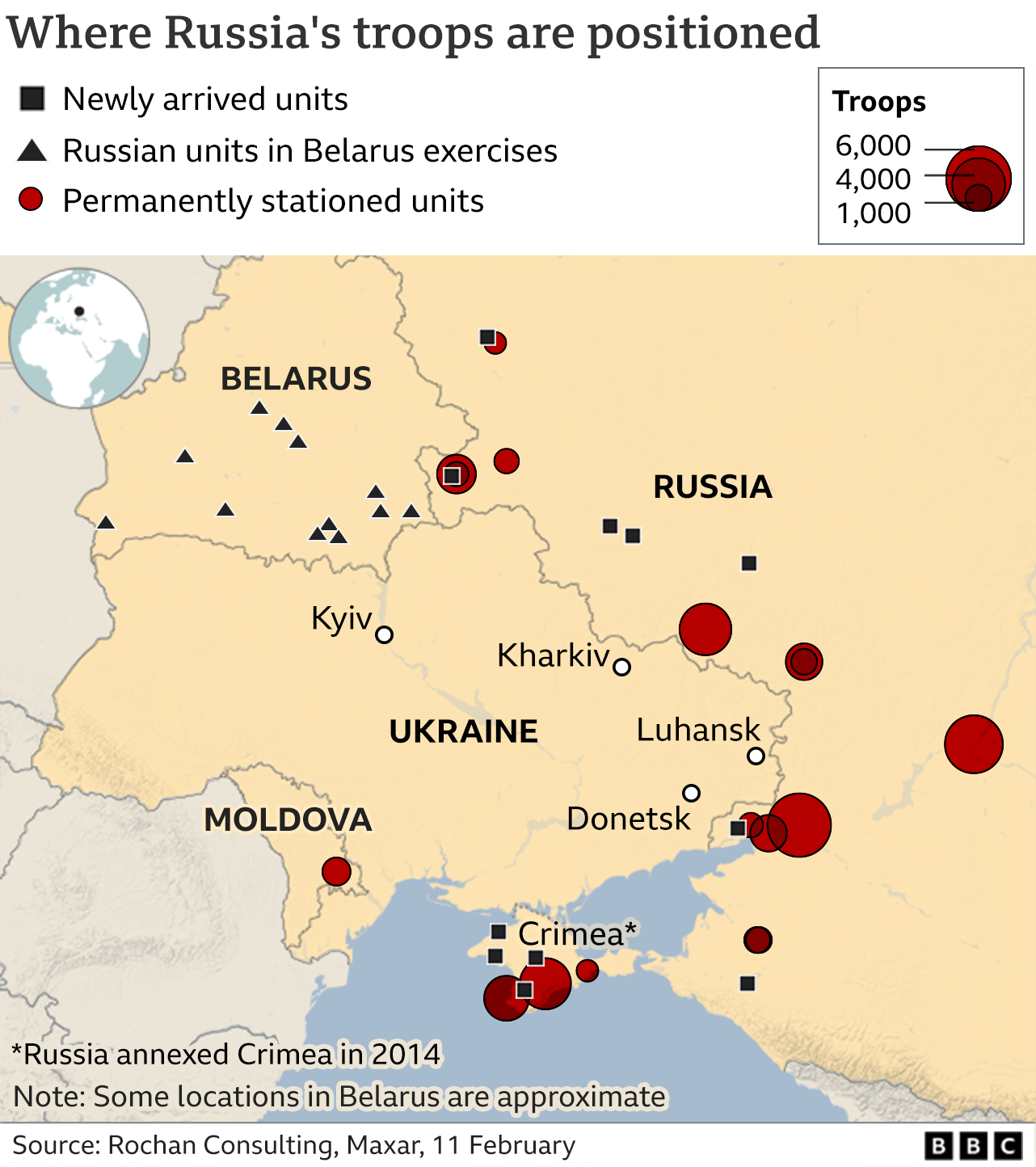
AFP VIA GETTY IMAGES Image caption, Ukrainian forces have been carrying out exercises amid concerns of a Russian invasion
Mr Biden said he would not send troops to rescue Americans if Moscow invades Ukraine.
He warned that “things could go crazy quickly” in the region.
Russia has repeatedly denied any plans to invade Ukraine despite massing more than 100,000 troops near the border.
But it has just begun massive military drills with neighbouring Belarus, and Ukraine has accused Russia of blocking its access to the sea.
The Kremlin says it wants to enforce “red lines” to make sure that its former Soviet neighbour does not join Nato.
The US State Department urged Americans in Ukraine to leave immediately.
“American citizens should leave now,” Mr Biden told NBC News.
“We’re dealing with one of the largest armies in the world. It’s a very different situation and things could go crazy quickly.”
Other nations, including the Netherlands, Japan and South Korea, have banned travel to Ukraine and urged their citizens in the country to leave as soon as possible.
World leaders, meanwhile, continued their frenzied diplomacy to defuse the current crisis over Ukraine.
Russia and Ukraine announced late on Thursday that they had failed to reach any breakthrough after nine hours of talks with French and German officials aimed at ending the separatist conflict in eastern Ukraine. Ukrainian envoy Andriy Yermak said while there were disagreements “there is a will to continue and there is a will to negotiate”.
The current tensions come eight years after Russia annexed Ukraine’s southern Crimea peninsula. Since then, Ukraine’s military has been locked in a war with Russian-backed rebels in eastern areas near Russia’s borders.
Earlier, the UK prime minister said he hoped “strong deterrence” and “patient diplomacy” could find a way through the crisis but the stakes were “very high”.
In a joint news conference in Brussels with Nato secretary-general Jens Stoltenberg, Mr Johnson said he did not believe Russia had yet taken a decision on whether to invade Ukraine but the UK’s intelligence “remains grim”.
Speaking to reporters after their meeting, Mr Wallace said he had made it clear that a Russian invasion of Ukraine would have “tragic consequences” and that Britain wanted to find a way to de-escalate tensions.
He also said that the UK was not currently recommending that its citizens leave Ukraine, adding that the foreign office guidance – to only travel to Ukraine when necessary – reflected “where we are at”.
His visit came a day after a frosty encounter between Foreign Minister Sergei Lavrov and Britain’s Liz Truss.
Mr Lavrov said relations between the UK and Russia “leave much to be desired” and were at the “lowest point over the past few years”. Ms Truss accused Russia of “Cold War rhetoric”.
Meanwhile, Ukraine accused Russia of blocking its access to the sea as Russia prepared for naval exercises.
Ukrainian Foreign Minister Dmytro Kuleba said the Sea of Azov had been completely blocked and the Black Sea almost fully cut off by Russian forces.
Russia’s naval exercises were due to take place next week in the two seas to the south of Ukraine, the Black Sea and the Sea of Azov.
However, Ukraine’s Border Guard Service said on Friday that Russia had told them it had cancelled its drill in the Sea of Azov, an internal sea bordered by both Russia and Ukraine. Ukraine’s port authority later said restrictions there had been lifted.

Russian naval drills were already taking place in Crimea on Friday, while 10 days of military exercises continued in Belarus, to the north of Ukraine.
There are fears that if Russia tries to invade Ukraine, the exercises put the Russian military close to the Ukrainian capital, Kyiv, making an attack on the city easier. Russia says its troops will return to their permanent bases after the drills end.
Ukraine has launched its own 10-day military exercises, though officials have given few details.

Moscow says it cannot accept that Ukraine – a former Soviet republic with deep social and cultural ties with Russia – could one day join the Western defence alliance Nato and has demanded that this be ruled out.
Russia has been backing a bloody armed rebellion in Ukraine’s eastern Donbas region since 2014. Some 14,000 people – including many civilians – have died in fighting since then.
There is some suggestion that a renewed focus on the so-called Minsk agreements – which sought to end the conflict in eastern Ukraine – could be used as a basis to defuse the current crisis.
Ukraine, Russia, France and Germany backed the accords in 2014-2015.
